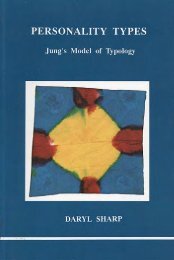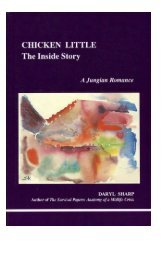Digesting Jung: Food for the Journey - Inner City Books
Digesting Jung: Food for the Journey - Inner City Books
Digesting Jung: Food for the Journey - Inner City Books
Create successful ePaper yourself
Turn your PDF publications into a flip-book with our unique Google optimized e-Paper software.
A Psychological Compass 19<br />
tests concretize what is inherently variable, and <strong>the</strong>reby overlook<br />
<strong>the</strong> dynamic nature of <strong>the</strong> psyche.<br />
Any system of typology is no more than a gross indicator of<br />
what people have in common and <strong>the</strong> differences between <strong>the</strong>m.<br />
<strong>Jung</strong>’s model is no exception. It is distinguished solely by its parameters—<strong>the</strong><br />
two attitudes and <strong>the</strong> four functions. What it does not<br />
and cannot show, nor does it pretend to, is <strong>the</strong> uniqueness of <strong>the</strong><br />
individual. Also, no one is a pure type. It would be foolish to even<br />
try to reduce an individual personality to this or that, just one thing<br />
or ano<strong>the</strong>r. Each of us is a conglomeration, an admixture of attitudes<br />
and functions that in <strong>the</strong>ir combination defy classification. All<br />
that is true, and emphatically acknowledged by <strong>Jung</strong>—<br />
One can never give a description of a type, no matter how complete,<br />
that would apply to more than one individual, despite <strong>the</strong> fact that in<br />
some ways it aptly characterizes thousands of o<strong>the</strong>rs. Con<strong>for</strong>mity is<br />
one side of a man, uniqueness is <strong>the</strong> o<strong>the</strong>r. 13<br />
—but it does not obviate <strong>the</strong> practical value of his model, particularly<br />
when one has run aground on <strong>the</strong> shoals of his or her own<br />
psychology.<br />
Whe<strong>the</strong>r <strong>Jung</strong>’s model is “true” or not—objectively true—is a<br />
moot point. Indeed, is anything ever “objectively” true? The real<br />
truth is that <strong>Jung</strong>’s model of psychological types has all <strong>the</strong> advantages<br />
and disadvantages of any scientific model. Although lacking<br />
statistical verification, it is equally hard to disprove. But it accords<br />
with experiential reality. Moreover, since it is based on a fourfold—<br />
mandala-like—way of looking at things that is archetypal, it is psychologically<br />
satisfying.<br />
As mentioned earlier, one’s behavior can be quite misleading in<br />
determining typology. For instance, to enjoy being with o<strong>the</strong>r people<br />
is characteristic of <strong>the</strong> extraverted attitude, but this does not<br />
automatically mean that a person who enjoys lots of company is an<br />
extraverted type. Naturally, one’s activities will to some extent be<br />
13 Psychological Types, CW 6, par. 895.










